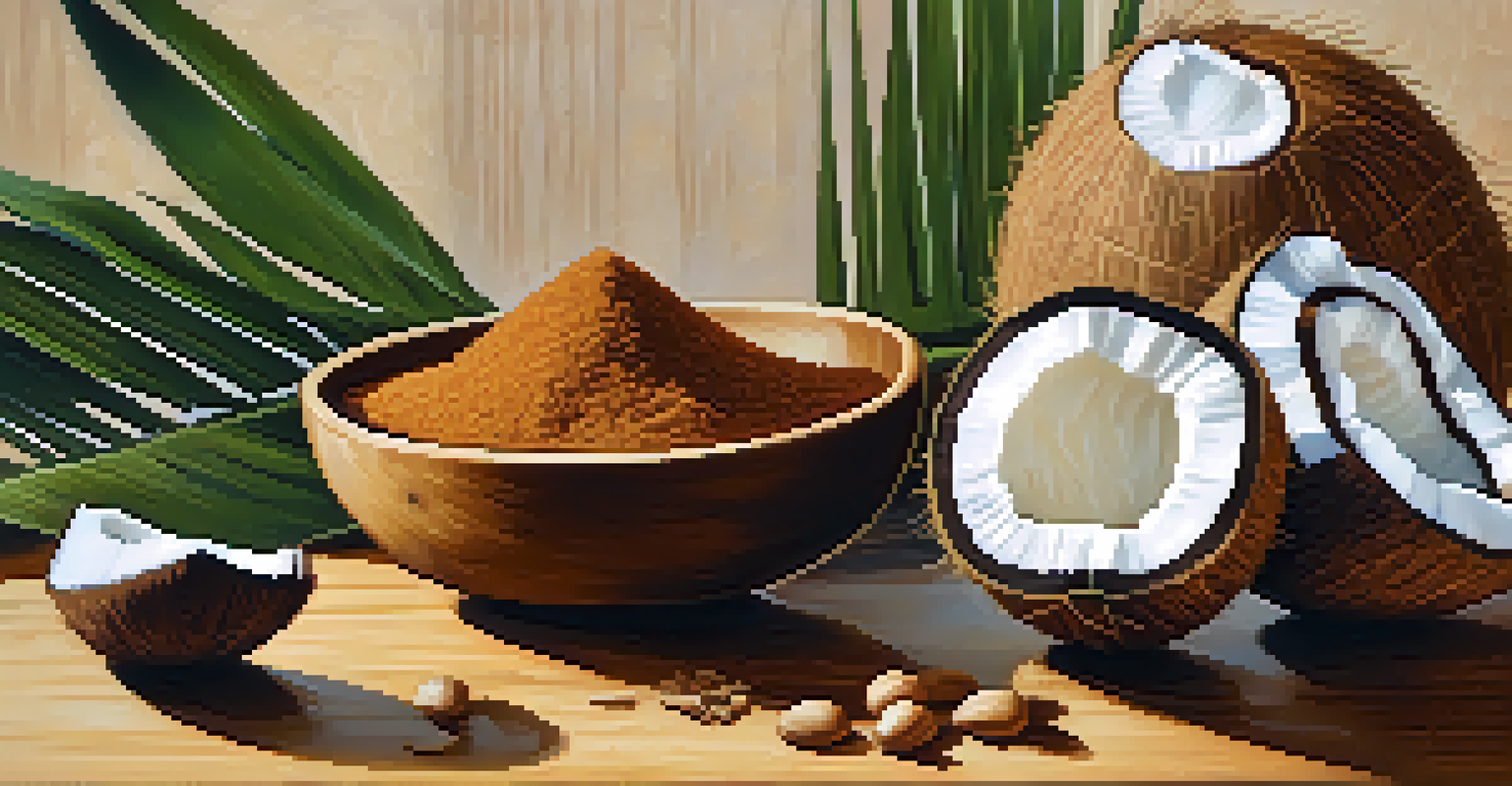Top 10 Plant-Based Sweeteners for Your Vegetarian Diet

Exploring the Benefits of Plant-Based Sweeteners
Plant-based sweeteners are a fantastic alternative to refined sugars, especially for those following a vegetarian or vegan diet. They often come from natural sources, making them less processed and more nutrient-rich. Incorporating these sweeteners can help regulate blood sugar levels and provide additional health benefits, such as antioxidants.
Let food be thy medicine and medicine be thy food.
For many, switching to plant-based sweeteners is not just about health; it’s also about embracing a more sustainable lifestyle. By choosing products derived from plants, you can minimize your environmental impact and support agricultural practices that are kinder to the planet. This makes it a win-win situation for both your body and the Earth.
Additionally, plant-based sweeteners can enhance your dishes in unique and flavorful ways. They come with their own distinct tastes and profiles, allowing you to experiment with various flavors in your cooking and baking. So, let’s dive into the top ten options that can sweeten your vegetarian diet!
1. Stevia: The Zero-Calorie Sweetener
Stevia is derived from the leaves of the Stevia rebaudiana plant and is incredibly popular among health-conscious individuals. It’s almost 200 times sweeter than sugar, meaning just a small amount can go a long way in satisfying your sweet tooth. Plus, it contains zero calories, making it an excellent choice for weight management.

What sets Stevia apart is its glycoside compounds, which provide the sweetness without the carbohydrates that usually spike blood sugar levels. This makes it an appealing option for those with diabetes or anyone looking to maintain stable energy levels. It can be used in beverages, baking, and even savory dishes!
Healthier Sugar Alternatives Available
Plant-based sweeteners like Stevia and Agave nectar offer lower glycemic options that can help manage blood sugar levels.
However, some people may find Stevia has a slightly bitter aftertaste. To combat this, consider blending it with other sweeteners or using it in recipes where its flavor can blend in seamlessly. Overall, Stevia is a fantastic addition to any vegetarian pantry.
2. Agave Nectar: Sweetness with a Low Glycemic Index
Agave nectar, derived from the agave plant, is a liquid sweetener that has gained popularity for its low glycemic index. This means it doesn’t cause rapid spikes in blood sugar, making it a safer option for those monitoring their glucose levels. Its syrupy texture makes it easy to incorporate into drinks, dressings, and desserts.
The greatest wealth is health.
With its mild flavor and smooth consistency, Agave nectar can easily replace honey or sugar in many recipes. It’s particularly effective in beverages like iced teas or smoothies, where its sweetness can shine without overwhelming other flavors. Just remember, a little goes a long way!
One thing to be mindful of, though, is that Agave nectar is high in fructose, which can be a concern if consumed in excess. Moderation is key to enjoying its sweetness while keeping a balanced diet. Overall, it’s a versatile sweetener that can enhance your vegetarian meals.
3. Maple Syrup: Nature’s Liquid Gold
Maple syrup is a beloved natural sweetener made from the sap of sugar maple trees. Its rich, warm flavor makes it a favorite for pancakes, but it can be used in a variety of dishes, from marinades to desserts. Plus, it contains antioxidants and minerals like zinc and manganese, adding a nutritional boost to your meals.
One of the best things about maple syrup is its versatility. It can be drizzled over oatmeal, used in baking, or even added to salad dressings for a hint of sweetness. The depth of its flavor can elevate simple dishes to gourmet status!
Sustainable Choices for the Planet
Choosing plant-based sweeteners supports environmentally friendly practices and reduces your overall carbon footprint.
However, it’s important to choose pure maple syrup to reap the health benefits. Some commercially available syrups may contain added sugars or artificial flavors. Look for labels that indicate 100% pure maple syrup to ensure you’re getting the real deal.
4. Coconut Sugar: A Sustainable Sweetener
Coconut sugar is made from the sap of coconut palm trees and is gaining traction for its sustainability and low glycemic index. It contains beneficial nutrients, such as iron, zinc, and calcium, making it a more nutritious alternative to regular sugar. Additionally, it has a caramel-like flavor that can enhance many recipes.
Using coconut sugar is straightforward; it can easily replace white or brown sugar in most recipes on a one-to-one basis. This makes it a convenient option for those looking to make a healthier switch without extensive recipe modifications. Whether you’re baking cookies or sweetening your coffee, coconut sugar is an easy choice.
However, while it’s a better option, it’s still important to use coconut sugar in moderation. Just because it’s plant-based doesn’t mean it’s calorie-free! Keep an eye on portion sizes to maintain a balanced diet.
5. Date Sugar: A Whole-Food Sweetener
Date sugar is made from ground, dehydrated dates and is a whole-food sweetener packed with fiber and nutrients. Unlike other sweeteners, it retains the natural properties of dates, providing a rich, caramel-like flavor that can enhance baked goods, smoothies, and even savory dishes. Its granulated form allows it to be used much like brown sugar.
One of the standout benefits of date sugar is its high fiber content, which can aid digestion and promote a feeling of fullness. This makes it not only a sweetener but also a functional ingredient in your diet. It’s especially great for those looking to reduce sugar intake without sacrificing flavor.
Unique Flavors Enhance Dishes
Plant-based sweeteners provide distinct tastes that can elevate your cooking and baking, adding depth to a variety of recipes.
However, date sugar doesn’t dissolve well in liquids, so it’s best suited for baking or recipes where it will be cooked. Be sure to experiment with it in various dishes to discover how its unique flavor can elevate your meals!
6. Brown Rice Syrup: A Mild, Sweet Alternative
Brown rice syrup is a sweetener made from cooked brown rice and enzymes that break down the starches into sugars. It has a mild, less sweet flavor compared to other sweeteners, making it a great option for balancing sweetness in recipes without overpowering other flavors. This syrup can be used in baking, granola, or even as a sugar substitute in sauces.
Its texture is thick and syrupy, allowing it to provide moisture in baked goods, which can enhance the overall texture of items like cookies or cakes. It’s also gluten-free, making it suitable for various dietary needs. Just keep in mind that brown rice syrup is still high in carbohydrates, so moderation is key.

One downside is that it has a higher glycemic index compared to some other natural sweeteners, so those managing their blood sugar levels should use it sparingly. Overall, it’s a unique option that can add a different flavor profile to your vegetarian cooking.
7. Monk Fruit Sweetener: A Calorie-Free Option
Monk fruit sweetener is derived from the monk fruit, a small round fruit grown in Southeast Asia. It contains compounds called mogrosides, which provide an intense sweetness without calories, making it a fantastic option for anyone looking to cut back on sugar. It’s about 150-200 times sweeter than sugar, so a little goes a long way!
This sweetener has a unique taste that some describe as fruity and refreshing, which can add an interesting twist to beverages and baked goods. It’s also great for those with dietary restrictions, as it’s naturally gluten-free and suitable for diabetics. You can find it in various forms, including granulated or liquid, making it easy to incorporate into your diet.
However, some products may contain fillers or other sweeteners, so be sure to check the label for purity. Monk fruit sweetener is a great addition to your pantry, especially for those seeking a natural sugar alternative without the calories.
8. Erythritol: A Sugar Alcohol with Less Guilt
Erythritol is a sugar alcohol that occurs naturally in certain fruits and fermented foods. It’s about 70% as sweet as sugar but contains almost zero calories, making it a popular choice for those on low-carb or sugar-free diets. It works well in baking and can be easily substituted for sugar in most recipes.
One of the benefits of erythritol is that it doesn’t raise blood sugar levels, making it a safe option for those with diabetes. Additionally, it has a refreshing taste and can even help reduce cravings for sweets. Its unique qualities make it a versatile ingredient in various dishes, from desserts to sauces.
However, some people may experience digestive discomfort when consuming sugar alcohols in large amounts. It’s best to start with small quantities to see how your body reacts. Overall, erythritol is an excellent option for those looking to enjoy sweetness without the calories.